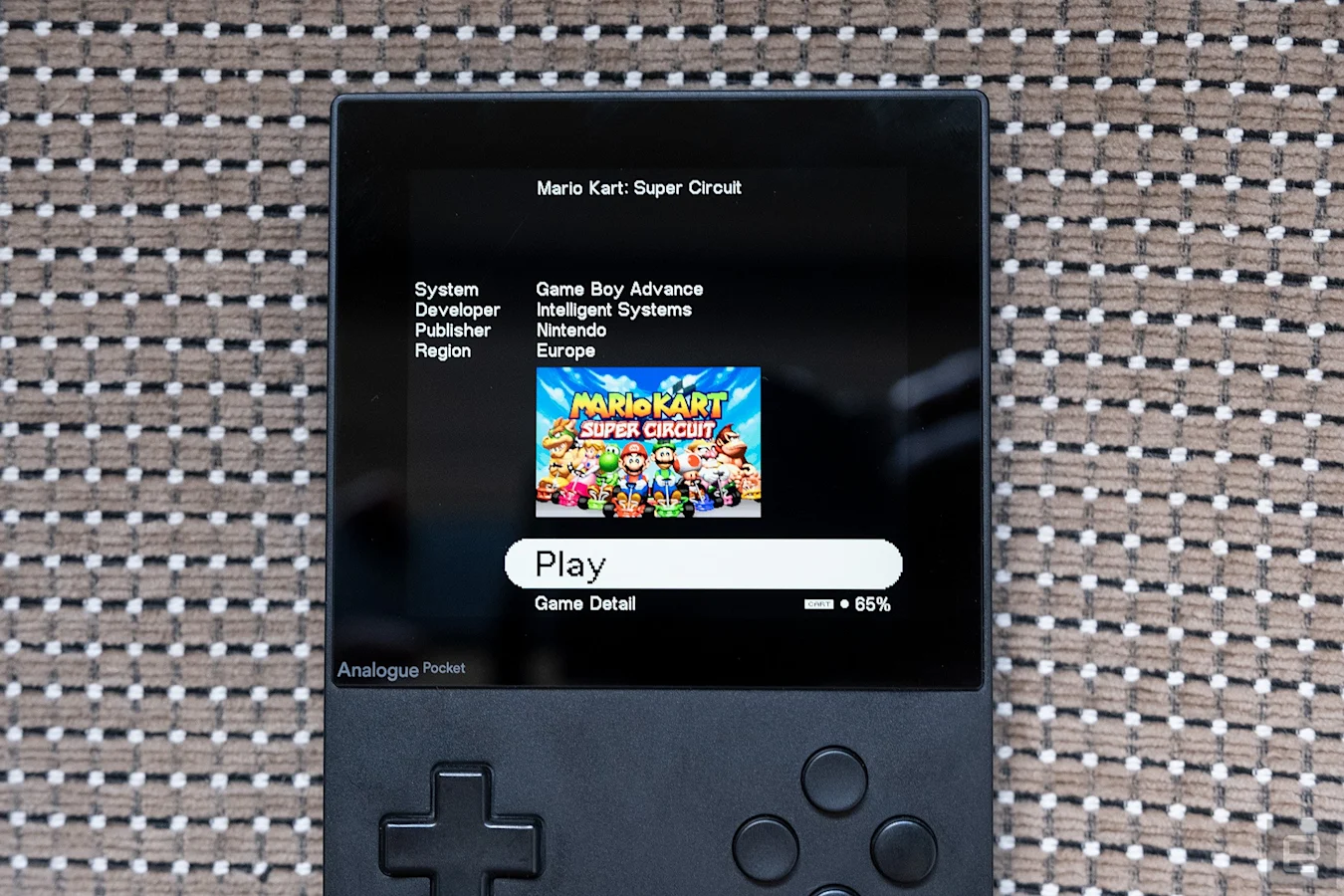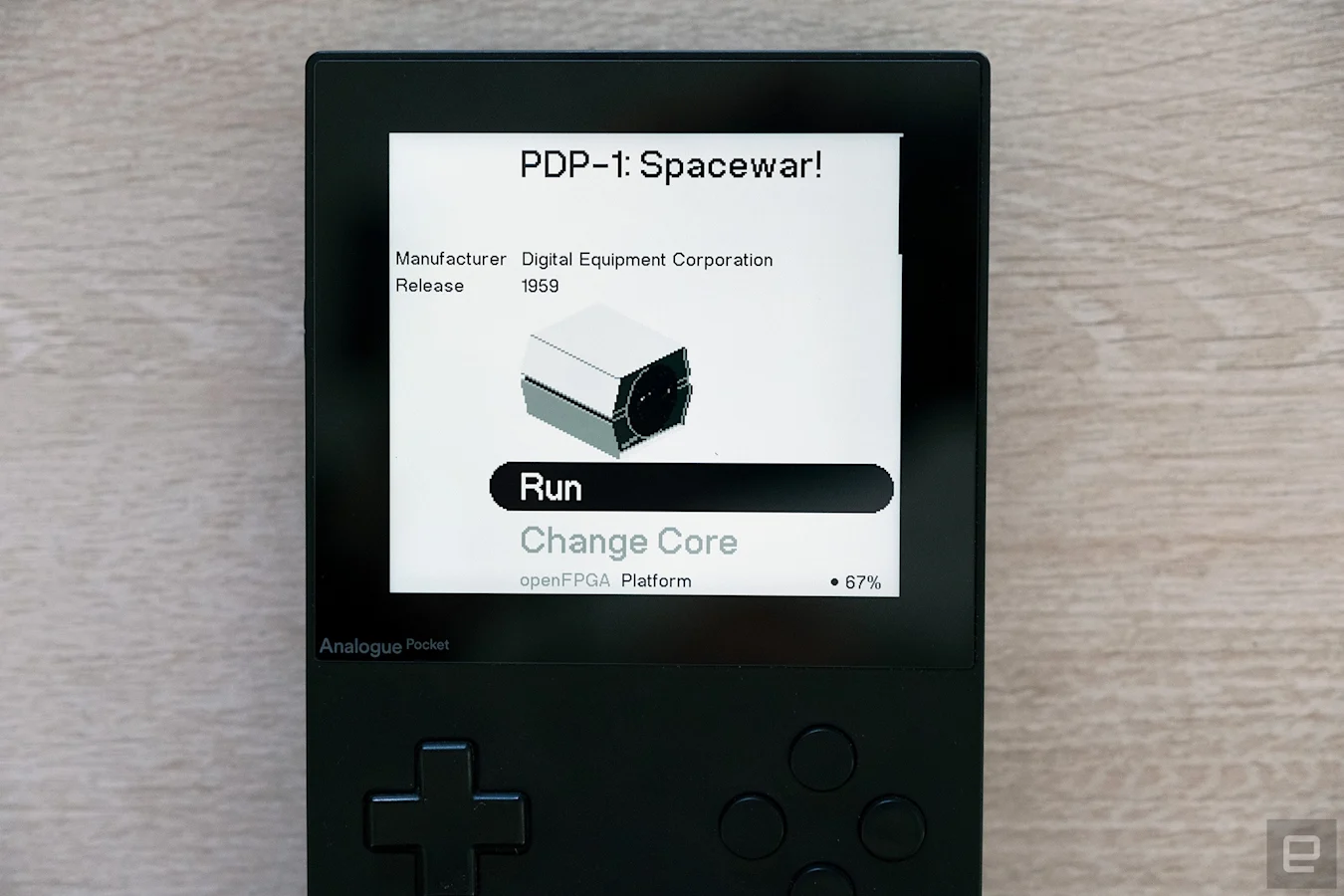It’s been a longer wait than we’d hoped, but the first major software update for the Analogue Pocket is finally here. It’s still a beta version so not everything is fully fleshed out, but you’ll at least be able to get a taste of the company’s vision for its fledgling OS. The beta does include a taste of the “reference” Library, much-improved game saves and, most excitingly, a glimpse at how third-party developers can use the Pocket to emulate consoles beyond the ones it already does.
Analogue OS 1.1
“Memories,” as Analogue calls save-states, still aren’t complete, but you can at least save a respectable 128 different game states which is a vast improvement on the minimal offering at launch (one slot for just one game total). You can create saves for any game, be that physical cartridge, or any “.pocket” GB Studio files you have (like Deadeus). The method for making a save is the same as before (Up+Analogue button) and you can recall a list of saves during play with Down+Analogue button. If you prefer to start from the last save point immediately, you can activate that in options also (rather than choosing from a list).
What you can’t do is keep updating the last save as you go along (think “save slots” in most emulators). Every new save will be a separate file and you’ll manage them individually. They show up in a long list which details the platform for the game you were playing (Game Boy, Game Gear etc.) the game’s title and date/time of the save.
Right now you can pull up Memories from the main menu (before loading a game), but choosing a save that corresponds to the cartridge in the slot doesn’t take you directly there (it’s grayed out), you have to load the game first. Analogue says that saves/Memories will soon have a screenshot attached and will be sortable in a variety of ways to make the experience much smoother in the full release this September.

James Trew / Engadget
What wasn’t in the OS at launch at all was the “Library” feature. All we knew was that it had the lofty goal of being a complete reference of all gaming history. From within that you’d see artwork for titles along with what company made the game, for what platform, what year and even what region or version you had inserted in the cartridge slot. In today’s beta, the Library is more of a splash screen before the game loads. Analogue says you’ll even be able to add your own image to a game in the Library, but again, expect that in the final release.
All the cartridges I tested had the correct details with a screenshot, but the information is limited (no mention of what year or version of the game I have etc.). Of course we’re excited to see how this scales up once it’s fully integrated, but for now it’s a pleasant stop along the way to playing a game. It’s worth noting that, as is, it only applies to cartridges and not titles launched from the GB Studio section (such as the aforementioned Deadeus which is a full game that Analogue made available for the Pocket at launch).
On a more practical note, Analogue has added support for more third-party controllers for when playing through the TV via the dock. To be fair, even though the officially supported list at launch was short (three 8Bitdo models plus the PS4 and Switch controllers), many more did still work. As of this release the number of 8Bitdo controllers supported jumps to 15 and PS5 owners can now use their DualSense, too, if they wish.
OpenFPGA
One of the more interesting features of the Pocket at launch was the presence of a spare FPGA chip. Analogue’s hardware doesn’t use software emulation, instead it uses a Field Programmable Gate Array (FPGA) to emulate consoles at the hardware level with cores — instructions for the FPGA that configure it to mimic a specific system. Analogue pledged that others would be able to develop cores for the Pocket, and today we see the first example of that.

James Trew / Engadget
A core for the PDP-1 has been created for the Pocket allowing you to play one of the very first videogames — Spacewar! — from 1962. As you can imagine, the game is very simple and doesn’t really tax the Pocket, but it’s a fitting first example for a console that wants to celebrate the history of gaming. And this should really just be the start of something more exciting as other developers – which can be anyone – get onboard.
What’s more of a surprise is that the entirety of the Pocket’s hardware appears to be open to developers. Initially, it was thought that the Pocket’s main FPGA would be kept for Analogue and the less powerful second FPGA was there to be tinkered with. But the company’s founder, Christopher Taber, confirmed to Engadget that “developers will be capable of implementing totally decentralized cores as far as they can push Pocket’s hardware … roughly up to the 32-bit generation.”
Best of all, we might not even have to wait very long to see what comes along. “Many third-party developers have had their hands on openFPGA for some time now and you can expect a plethora of new amazing things being publicly released by them shortly on/after July 29th”, Taber told Engadget, before concluding: “We are not f***ing around with this.”
All products recommended by Engadget are selected by our editorial team, independent of our parent company. Some of our stories include affiliate links. If you buy something through one of these links, we may earn an affiliate commission.

